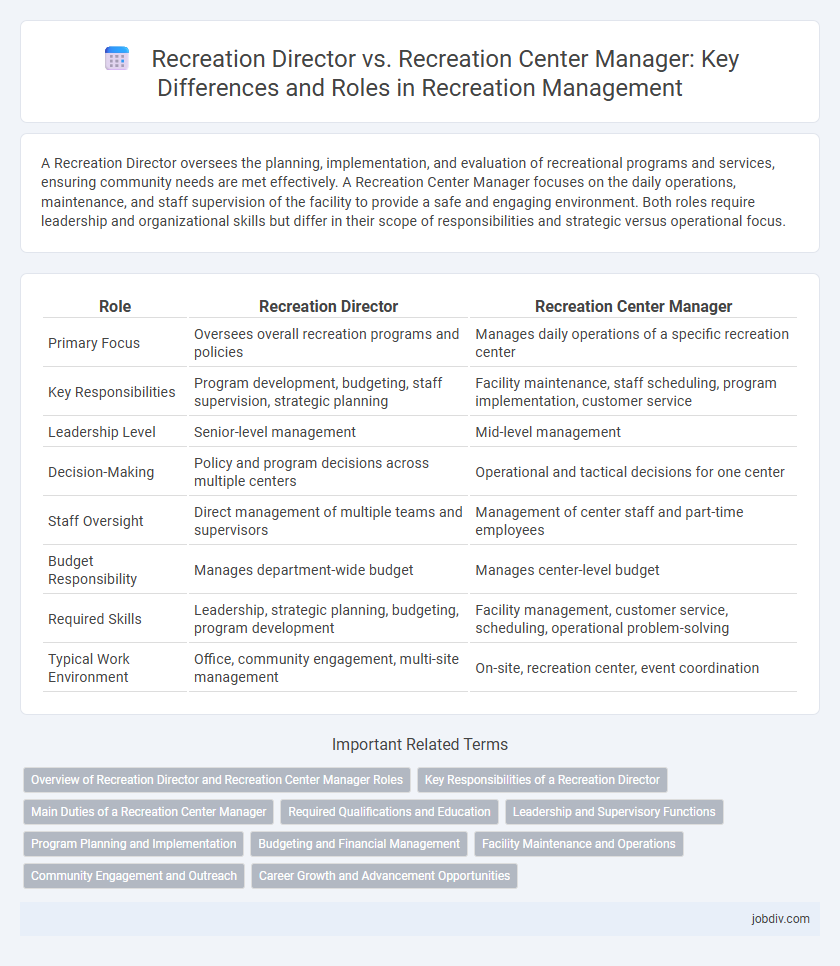A Recreation Director oversees the planning, implementation, and evaluation of recreational programs and services, ensuring community needs are met effectively. A Recreation Center Manager focuses on the daily operations, maintenance, and staff supervision of the facility to provide a safe and engaging environment. Both roles require leadership and organizational skills but differ in their scope of responsibilities and strategic versus operational focus.
Table of Comparison
| Role | Recreation Director | Recreation Center Manager |
|---|---|---|
| Primary Focus | Oversees overall recreation programs and policies | Manages daily operations of a specific recreation center |
| Key Responsibilities | Program development, budgeting, staff supervision, strategic planning | Facility maintenance, staff scheduling, program implementation, customer service |
| Leadership Level | Senior-level management | Mid-level management |
| Decision-Making | Policy and program decisions across multiple centers | Operational and tactical decisions for one center |
| Staff Oversight | Direct management of multiple teams and supervisors | Management of center staff and part-time employees |
| Budget Responsibility | Manages department-wide budget | Manages center-level budget |
| Required Skills | Leadership, strategic planning, budgeting, program development | Facility management, customer service, scheduling, operational problem-solving |
| Typical Work Environment | Office, community engagement, multi-site management | On-site, recreation center, event coordination |
Overview of Recreation Director and Recreation Center Manager Roles
Recreation Directors oversee program development, budgeting, and staff management to ensure community engagement and effective recreation services. Recreation Center Managers focus on the daily operations, facility maintenance, and coordinating activities within a specific recreation center. Both roles require leadership skills, but Recreation Directors typically have broader strategic responsibilities while Recreation Center Managers handle operational management.
Key Responsibilities of a Recreation Director
A Recreation Director oversees the planning, development, and implementation of community recreation programs, ensuring alignment with organizational goals and community needs. They manage budgets, coordinate staff, and establish policies to enhance program quality and participant satisfaction. Strategic leadership and public relations are key responsibilities that distinguish a Recreation Director from a Recreation Center Manager, who typically focuses on the day-to-day operations of a facility.
Main Duties of a Recreation Center Manager
A Recreation Center Manager primarily oversees the daily operations and maintenance of recreational facilities, ensures safety protocols are followed, and manages staff and budgets to deliver high-quality community programs. They coordinate schedules, maintain equipment, and enforce facility rules to create a safe and welcoming environment for all participants. Their role emphasizes administrative management, facility upkeep, and direct interaction with the public, differing from the broader program planning responsibilities of a Recreation Director.
Required Qualifications and Education
Recreation Directors typically require a bachelor's degree in recreation management, public administration, or a related field, along with several years of leadership experience in community or recreational programs. Recreation Center Managers often need an associate or bachelor's degree in recreation, kinesiology, or facility management, with strong skills in facility operations and staff supervision. Both roles benefit from certifications such as CPR, first aid, and Certified Park and Recreation Professional (CPRP) credentials to enhance qualifications and career advancement.
Leadership and Supervisory Functions
A Recreation Director typically oversees multiple programs and facilities, providing strategic leadership and ensuring alignment with community goals, while a Recreation Center Manager focuses on the day-to-day operational supervision of a single facility. Leadership for Recreation Directors involves long-term planning, budgeting, and policy development to enhance overall recreational services. Recreation Center Managers execute these plans by directly supervising staff, managing schedules, and maintaining a safe, engaging environment for participants.
Program Planning and Implementation
Recreation Directors oversee the strategic planning and development of community programs, ensuring alignment with organizational goals and budget constraints. Recreation Center Managers focus on the hands-on implementation and daily management of these programs, coordinating staff and resources for smooth operation. Both roles require expertise in program planning, but Directors emphasize long-term vision while Managers ensure effective execution.
Budgeting and Financial Management
A Recreation Director oversees the overall budgeting process, setting financial goals and allocating resources across multiple programs or facilities to ensure fiscal responsibility. A Recreation Center Manager focuses on managing the day-to-day budget of a single center, controlling expenses, and maximizing the efficient use of funds within their facility. Both roles require strong financial management skills, but the director handles broader financial strategy while the manager executes detailed budget oversight.
Facility Maintenance and Operations
A Recreation Director oversees strategic planning and overall programming while ensuring facility maintenance aligns with community standards and budgets. In contrast, a Recreation Center Manager focuses on daily facility operations, coordinating maintenance schedules, equipment upkeep, and staff supervision to maintain safe, functional recreational environments. Both roles require expertise in facility management, but the Director emphasizes high-level operational strategies, whereas the Manager handles hands-on maintenance and operational execution.
Community Engagement and Outreach
A Recreation Director leads strategic planning and oversees program development to enhance community engagement, focusing on building partnerships and promoting diverse outreach initiatives. In contrast, a Recreation Center Manager handles day-to-day operations, ensuring effective facility management and directly interacting with community members to support participation and program delivery. Both roles prioritize fostering inclusive environments but differ in scope, with Directors shaping overall community outreach strategies and Managers executing them on the ground.
Career Growth and Advancement Opportunities
Recreation Directors often have broader strategic responsibilities and oversee multiple facilities or programs, offering higher-level career growth opportunities in large organizations or municipalities. Recreation Center Managers typically focus on day-to-day operations within a single facility, which can serve as a stepping stone to roles with increased administrative authority. Career advancement for Recreation Center Managers usually involves gaining experience and certifications to qualify for Recreation Director positions or specialized leadership roles in recreation management.
Recreation Director vs Recreation Center Manager Infographic

 jobdiv.com
jobdiv.com